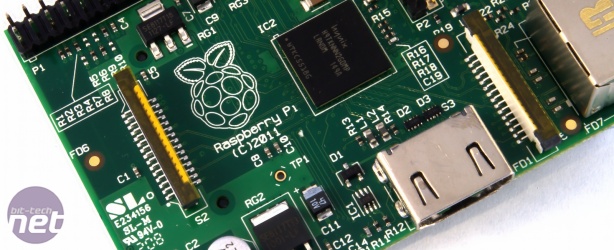Raspberry Pi review
April 16, 2012 | 14:24
Companies: #arm #broadcom #hynix #raspberry-pi #raspberry-pi-foundation

Eben Upton has always been up-front about the compute performance of the Pi. With an outdated ARM11 CPU running at 700MHz, and L2 cache which is entirely cut off from the processor and reserved for GPU use by default, the current design is never going to offer the kind of performance seen on the dual-core Qualcomm Dragonboard or Samsung Origen development boards.
To test the general purpose compute performance of the Pi, we took the current release of the Debian Linux OS and installed the SysBench benchmark suite. While we would have loved to use our usual benchmarks, that's not possible: the devices we usually test run on the x86 instruction set architecture, and our usual packages aren't compatible with an ARM chip.
The SysBench CPU test is purely synthetic: prime numbers are calculated up to a selected maximum, using 64-bit integer mathematics. That's something which puts the Pi on an immediate back footing: as with all current-generation ARM processors, the Broadcom BCM2835 is a 32-bit part.
For comparison, we ran the same benchmark on a Marvell SheevaPlug plug-top computer, which has a somewhat faster Ferroceon ARM chip running at 1.2GHz to the Pi's 700MHz. We also ran the same benchmark on a mid-range desktop CPU, an Intel Core 2 Duo E8400 at 3GHz, more for the fun of it than the hopes of drawing any real performance comparison.
On a standard run, the Pi scored a 95th percentile request time of 106.72ms. The faster SheevaPlug, by contrast, took just 77.56ms per request. The same benchmark running on a native 64-bit Core 2 Duo E8400 took an ever-so-slightly quicker 0.85ms.
Far from a defeat for the Pi, the scores actually prove that the Broadcom BCM2835 is a remarkably capable chip: despite its outdated architecture, the Pi is more efficient per-cycle than the rival Ferroceon chip. If the BCM2835 were running at the same 1.2GHz frequency as the Ferroceon in the SheevaPlug, it would have completed the benchmark in around 62.25ms.
To test the general purpose compute performance of the Pi, we took the current release of the Debian Linux OS and installed the SysBench benchmark suite. While we would have loved to use our usual benchmarks, that's not possible: the devices we usually test run on the x86 instruction set architecture, and our usual packages aren't compatible with an ARM chip.
The SysBench CPU test is purely synthetic: prime numbers are calculated up to a selected maximum, using 64-bit integer mathematics. That's something which puts the Pi on an immediate back footing: as with all current-generation ARM processors, the Broadcom BCM2835 is a 32-bit part.
For comparison, we ran the same benchmark on a Marvell SheevaPlug plug-top computer, which has a somewhat faster Ferroceon ARM chip running at 1.2GHz to the Pi's 700MHz. We also ran the same benchmark on a mid-range desktop CPU, an Intel Core 2 Duo E8400 at 3GHz, more for the fun of it than the hopes of drawing any real performance comparison.
On a standard run, the Pi scored a 95th percentile request time of 106.72ms. The faster SheevaPlug, by contrast, took just 77.56ms per request. The same benchmark running on a native 64-bit Core 2 Duo E8400 took an ever-so-slightly quicker 0.85ms.
Far from a defeat for the Pi, the scores actually prove that the Broadcom BCM2835 is a remarkably capable chip: despite its outdated architecture, the Pi is more efficient per-cycle than the rival Ferroceon chip. If the BCM2835 were running at the same 1.2GHz frequency as the Ferroceon in the SheevaPlug, it would have completed the benchmark in around 62.25ms.

MSI MPG Velox 100R Chassis Review
October 14 2021 | 15:04









Want to comment? Please log in.